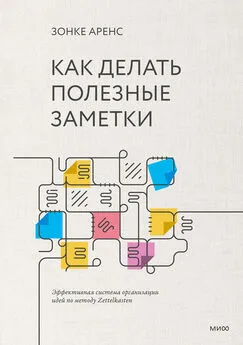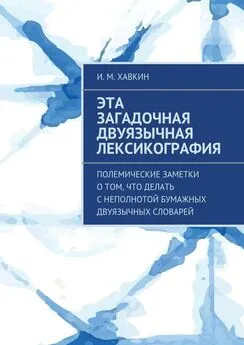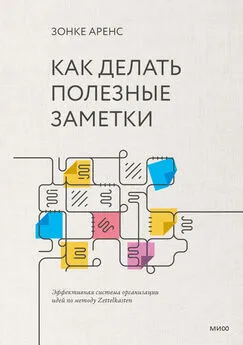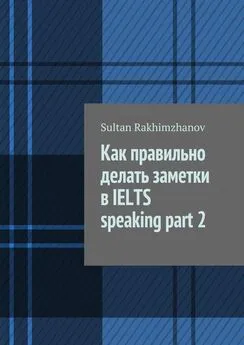Зонке Аренс - Как делать полезные заметки
- Название:Как делать полезные заметки
- Автор:
- Жанр:
- Издательство:Манн, Иванов и Фербер
- Год:2022
- Город:Москва
- ISBN:9785001699859
- Рейтинг:
- Избранное:Добавить в избранное
-
Отзывы:
-
Ваша оценка:
Зонке Аренс - Как делать полезные заметки краткое содержание
С помощью этой книги вы освоите принцип полезных заметок и поймете не только то, как он работает, но и почему. Неважно, кто вы и чем занимаетесь — учитесь в университете, пишете статьи или просто читаете книги и изучаете интересную информацию, — с помощью метода Zettelkasten вы научитесь делать это более продуктивно и без лишних усилий.
Как делать полезные заметки - читать онлайн бесплатно ознакомительный отрывок
Интервал:
Закладка:
И наконец очень хорошая новость. Ящик для заметок настолько прост, насколько это возможно. Читайте с ручкой в руке, делайте полезные заметки и устанавливайте связи между ними. Идеи придут сами по себе, и ваше письмо будет развиваться. Нет необходимости начинать с нуля. Продолжайте делать то, что вы бы делали в любом случае: читать, думать и писать. Просто по пути делайте полезные заметки.
Библиография
1. Ahrens, Sönke. 2014. Experiment and Exploration: Forms of World-Disclosure: From Epistemology to Bildung. Contemporary Philosophies and Theories in Education, volume 6. Dordrecht: Springer.
2. Аллен, Дэвид. Как привести дела в порядок. Искусство продуктивности без стресса.М.: Манн, Иванов и Фербер, 2010.
3. Allison, Scott T., and David M. Messick. 1988. «The Feature-Positive Effect, Attitude Strength, and Degree of Perceived Consensus.» Personality and Social Psychology Bulletin 14 (2): 231–241.
4. Anders Ericsson, K. 2008. «Deliberate Practice and Acquisition of Expert Performance: A General Overview.» Academic Emergency Medicine 15 (11): 988–994.
5. Andreasen, Nancy C. 2014. «Secrets of the Creative Brain.» The Atlantic, August.
6. Arnold, Kathleen M., and Kathleen B. McDermott. 2013. «Test-Potentiated Learning: Distinguishing between Direct and In-direct Effects of Tests.» Journal of Experimental Psychology: Learning, Memory, and Cognition 39 (3): 940–945.
7. Balduf, Megan. 2009. «Underachievement Among College Stu-dents». Journal of Advanced Academics 20 (2): 274–294.
8. Baram, T., Y. Chen, C. Burgdorff, and C. Dubé. 2008. «Short-term Stress Can Affect Learning And Memory.» ScienceDaily.
9. Baumeister, R. F., E. Bratslavsky, M. Muraven, and D. M. Tice. 1998. «Ego Depletion: Is the Active Self a Limited Resource?» Journal of Personality and Social Psychology 74 (5): 1252–1265.
10. Birnbaum, Monica S., Nate Kornell, Elizabeth Ligon Bjork, and Robert A. Bjork. 2013. «Why Interleaving Enhances Inductive Learning: The Roles of Discrimination and Retrieval». Memory & Cognition 41 (3): 392–402.
11. Bjork, Robert A. 2011. «On the Symbiosis of Remembering, Forgetting and Learning.» In Successful Remembering and Successful Forgetting: a Festschrift in Honor of Robert A. Bjork, edited by Aaron S. Benjamin, 1–22. New York, NY: Psychology Press.
12. Bliss, T. V. P., G. L. Collingridge, and R. G. M. Morris, Hrsg. 2004. Long-term Potentiation: Enhancing Neuroscience for 30 Years. Oxford; New York: Oxford University Press.
13. Bornstein, Robert F. 1989. «Exposure and Affect: Overview and Meta-Analysis of Research, 1968–1987.» Psychological Bulletin 106 (2): 265–289.
14. Brems, Christiane, Michael R. Baldwin, Lisa Davis, and Lorraine Namyniuk. 1994. «The Imposter Syndrome as Related to Teaching Evaluations and Advising Relationships of University Faculty Members.» The Journal of Higher Education 65 (2): 183.
15. Brown, Peter C., Henry L. Roedinger III, and Mark A. McDaniel 2014. Make It Stick. Cambridge, MA: Harvard University Press.
16. Bruner, Jerome S. 1973. Beyond the Information Given: Studies in Psychology of Knowing. Edited by Jeremy M. Anglin. New York: W.W. Norton & Company.
17. Bruya, Brian, Hrsg. 2010. Effortless Attention: A New Perspective in the Cognitive Science of Attention and Action. Cambridge, Mass: The MIT Press.
18. Buehler, Roger, Dale Griffin, and Michael Ross. 1994. «Exploring The ‘Planning Fallacy:’ Why People Underestimate Their Task Completion Times.» Journal of Personality and Social Psychology 67 (3): 366–381.
19. Buehler, Roger, Dale Griffin, and Michael Ross. 1995. «It’s About Time: Optimistic Predictions in Work and Love.» European Review of Social Psychology 6 (1): 1–32.
20. Burkeman, Oliver. 2013. The Antidote: Happiness for People Who Can’t Stand Positive Thinking. Edinburgh: Canongate Books.
21. Byrne, John H. 2008. Learning and Memory: A Comprehensive Reference, Four-Volume Set. Cambridge, MA: Academic Press.
22. Carey, Benedict. 2014. How We Learn: The Surprising Truth About When, Where, and Why It Happens. New York: Random House.
23. Carter, Evan C., and Michael E. McCullough. 2014. «Publication Bias and the Limited Strength Model of Self-Control: Has the Evidence for Ego Depletion Been Overestimated?» Frontiers in Psychology 5 (July).
24. Clance, Pauline R., and Suzanne A. Imes. 1978. «The Imposter Phenomenon in High Achieving Women: Dynamics and Therapeutic Intervention.» Psychotherapy: Theory, Research & Practice 15 (3): 241–247.
25. Clark, Charles H. 1958. Brainstorming: The Dynamic New Way to Create Successful Ideas. Garden City, NY: Doubleday & Company.
26. Cowan, N. 2001. «The Magical Number 4 in Short-Term Memory: A Reconsideration of Mental Storage Capacity.» The Behavioral and Brain Sciences 24 (1): 87–114.
27. Csikszentmihalyi, Mihaly. 1975. Beyond Boredom and Anxiety. San Francisco: Jossey-Bass.
28. Currey, Mason. 2013. Daily Rituals: How Great Minds Make Time, Find Inspiration, and Get to Work. Pan Macmillan.
29. Darwin, Charles. 1958. The Autobiography of Charles Darwin, 1809–1882: With Original Omissions Restored. Collins.
30. Dean, Jeremy. 2013. Making Habits, Breaking Habits: Why We Do Things, Why We Don’t, and How to Make Any Change Stick. Boston, MA: Da Capo Press.
31. De Bono, Edward. 1998. Simplicity. London; New York: Viking.
32. DePasque, Samantha, and Elizabeth Tricomi. 2015. «Effects of Intrinsic Motivation on Feedback Processing During Learning.» NeuroImage 119 (October): 175–186.
33. Добрынин, Н.Ф. Основные вопросы психологии внимания // Психологическая наука в СССР. М.: Издательство Академии педагогических наук РСФСР, 1960.
34. Doyle, Terry. 2008. Helping Students Learn in a Learner-Centered Environment: A Guide to Facilitating Learning in Higher Education. Sterling, Virginia: Stylus Publishing.
35. Doyle, Terry, and Todd Zakrajsek. 2013. The New Science of Learning: How to Learn in Harmony With Your Brain. Sterling, Virginia: Stylus Publishing.
36. Duckworth, Angela L., and Martin E. P. Seligman. 2005. “Self-Discipline Outdoes IQ in Predicting Academic Performance of Adolescents”. Psychological Science 16 (12): 939–944.
37. Dunlosky, John, Katherine A. Rawson, Elizabeth J. Marsh, Mitchell J. Nathan, and Daniel T. Willingham. 2013. «Improving Students’ Learning With Effective Learning Techniques Promising Directions From Cognitive and Education-al Psychology.» Psychological Science in the Public Interest 14 (1): 4–58.
38. Dweck, Carol S. 2006. Mindset: The New Psychology of Success. New York: Random House.
39. Dweck, Carol S. 2013. Self-Theories: Their Role in Motivation, Personality, and Development. New York: Psychology Press.
40. Ebbinghaus, Hermann. (1885). Über das Gedächtnis: Untersuchungen zur experimentellen Psychologie. Berlin: Duncker & Humblot.
41. Engber, Daniel, and Christina Cauterucci. 2016. «Everything Is Crumbling.» Slate, March 6.
42. Ericsson, K. Anders, Ralf T. Krampe, and Clemens Tesch-Römer. 1993. «The Role of Deliberate Practice in the Acquisition of Expert Performance.» Psychological Review 100 (3): 363–406.
43. Fehrman, Craig. 2011. «The Incredible Shrinking Sound Bite.» Boston.com, January 2.
44. Feynman, Richard P. 1963. «The Problem of Teaching Physics in Latin America.» http://calteches.library.caltech.edu/46/2/LatinAmerica.htm.
45. Feynman, Richard P. 1985. «Surely You’re Joking, Mr. Feynman!»: Adventures of a Curious Character. New York: W.W. Norton.
46. Fishbach, Ayelet, Tal Eyal, and Stacey R. Finkelstein. 2010. How Positive and Negative Feedback Motivate Goal Pursuit: Feedback Motivates Goal Pursuit. Social and Personality Psychology Compass, 4(8), 517–530.
47. Fleck, Ludwik. 1979. The Genesis and Development of a Scientific Fact, edited by T.J. Trenn and R.K. Merton, foreword by Thomas Kuhn. Chicago: University of Chicago Press.
48. Flyvbjerg, Bent. 2001. Making social science matter: Why Social Inquiry Fails and How It Can Succeed Again. Oxford, UK; New York: Cambridge University Press.
49. Franklin, Benjamin. 1840. Memoirs of Benjamin Franklin. Edited by William Duane. McCarty & Davis.
50. Fritzsche, Barbara A., Beth Rapp Young, and Kara C. Hickson. 2003. «Individual Differences in Academic Procrastination Tendency and Writing Success». Personality and Individual Differences 35 (7): 1549–1557.
51. Гадамер, Х.-Г. Истина и метод. М.: Прогресс, 1988.
52. Gawande, Atul. 2002. Complications: A Surgeon’s Notes on an Imperfect Science. New York: Metropolitan Books.
53. Гаванде, Атул. Чек-лист. Как избежать глупых ошибок, ведущих к фатальным последствиям. М.: Альпина Паблишер, 2014.
54. Getzels, Jacob Warren, and Mihaly Csikszentmihalyi. 1976. The Creative Vision: A Longitudinal Study of Problem Finding in Art. New York: Wiley.
55. Gigerenzer, Gerd. 2008. Gut Feelings: The Intelligence of the Unconscious. New York: Viking Penguin.
56. Гилберт, Дэниел. Спотыкаясь о счастье. М.: Альпина Паблишер, 2015.
57. Glynn, Shawn M., Gita Taasoobshirazi, and Peggy Brickman. 2009. «Science Motivation Questionnaire: Construct Validation with Nonscience Majors». Journal of Research in Science Teaching 46 (2): 127–146.
58. Goldstone, Robert L., and Uri Wilensky. 2008. «Promoting Transfer by Grounding Complex Systems Principles.» Journal of the Learning Sciences 17 (4): 465–516.
59. Govorun, Olesya, and B. Keith Payne. 2006. ‘Ego — Depletion and Prejudice: Separating Automatic and Controlled Components’. Social Cognition 24 (2): 111–136.
60. Granovetter, Mark S. 1973. «The Strength of Weak Ties.» American Journal of Sociology 78 (6): 1360–1380.
61. Gunel, Murat, Brian Hand, and Vaughan Prain. 2007. «Writing for Learning in Science: A Secondary Analysis of Six Studies.» International Journal of Science and Mathematics Education 5 (4): 615–637.
62. Hagen, Wolfgang. 1997. Die Realität der Massenmedien. Radio Bremen im Gespräch mit Niklas Luhmann. http://www.whagen.de/gespraeche/LuhmannMassenmedien.htm.
63. Hallin, Daniel C. 1994. We Keep America on Top of the World: Television Journalism and the Public Sphere. London; New York: Routledge.
64. Hearn, Marsha Davis, Tom Baranowski, Janice Baranowski, Colleen Doyle, Matthew Smith, Lillian S. Lin, and Ken Resnicow. 1998. «Environmental Influences on Dietary Behavior among Children: Availability and Accessibility of Fruits and Vegetables Enable Consumption». Journal of Health Education 29 (1): 26–32.
65. Hollier, Denis. 2005. «Notes (on the Index Card).» October 112 (April): 35–44.
66. Inzlicht, M., L. McKay, and J. Aronson. 2006. «Stigma as Ego Depletion: How Being the Target of Prejudice Affects Self-Control». Psychological Science 17 (3): 262–269.
67. Inzlicht, Michael, and Malte Friese. 2019. «The Past, Present, and Future of Ego Depletion.» Social Psychology 50 (5–6): 370–378.
68. James, William. 1890. The Principles of Psychology. New York: H. Holt and Company.
Читать дальшеИнтервал:
Закладка:





![Наталья Краснова - [НЕ]ВЕРНОСТЬ. Что делать, когда не знаешь, что делать](/books/1163779/natalya-krasnova-ne-vernost-chto-delat-kogda-n.webp)




